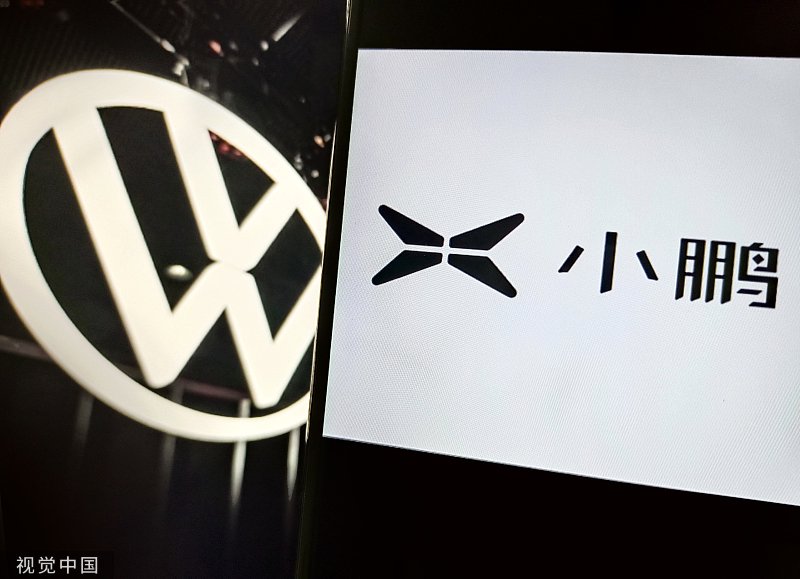폭스바겐 그룹의 중국의 새로운 전력 신호에 대한 첫 투자 역할 반전: 기술에서 시장으로
과거 30 년, 중국은 글로벌 자동차 대기업들이 시장을 위해 기술을 교환한 성공적인 사례입니다, but this scene was rewritten last night. Volkswagen made a strategic investment of 4.99% 안으로 엑스펑 모터스. This is the first time that a multinational automobile company has formally invested in a Chinese start-up automobile company. According to the information they disclosed, this is still a technology-for-market transaction, but this time the roles of both parties have changed.

Choosing Xpeng Motors as a partner, Volkswagen values its technical reserves in intelligence. A number of industry insiders pointed out to Jiemian News that in terms of smart cockpit and advanced automatic driving assistance technology, Xpeng Motors has been benchmarking against Tesla since its establishment, and its software technology reserve is at the forefront of China’s local new forces, which just makes up for it. It overcomes the shortcomings of the Volkswagen Group.
Chinese local independent brands such as 지리 그리고 증권 시세 표시기 have reached in-depth cooperation with other global auto companies, such as BYD and 도요타, Geely’s Volvo, 등., all have a certain competitive relationship with Volkswagen in the global market.
대조적으로, Xiaopeng is more in line with Volkswagen’s main purpose of seeking technological input.
According to the agreement, the two parties will jointly develop two B-class electric vehicle models based on the Xpeng Motors G9 model platform, smart cockpit and advanced driver assistance system software at the initial stage of cooperation, and sell them exclusively in the Chinese market under the Volkswagen brand name. Production of related models is expected to begin in 2026.
Xiaopeng Motors said that the two parties will also launch potential strategic cooperation in electric vehicle platforms, software technology and supply chain.
Zhang Yichao, an analyst in the auto industry, was interviewed by Jiemian News and pointed out that Volkswagen’s stake in Xpeng is an indirect recognition of the development of China’s new energy vehicle technology and has benchmarking significance. 동시에, the cooperation between the two parties will help Volkswagen make up for the slow progress of software development and launch electrified models that meet Chinese consumers more quickly.
In the past two years, Volkswagen’s advantages in the traditional fuel vehicle business have gradually faded, and the smart electric vehicle business that has invested heavily has not yet achieved results, especially in the Chinese market where its sales account for about one-third, sales have declined significantly. In the first half of this year, China was the only major market for VW to see a decline in sales.
In terms of electric vehicle sales, Volkswagen only sold 62,400 vehicles in China, which was lower than the same period last year, accounting for only 19.38% of its global electric vehicle sales.
Volkswagen is trying to develop its own electric vehicle platform to form differentiated competition, reduce costs and protect profits. 그렇지만, it is difficult for traditional automobile manufacturing companies to update and transform their research and development ideas in a timely manner, resulting in repeated delays in the launch of new products.
Zhang Junyi, managing partner of Oliver Wyman Consulting, told Jiemian News that Japanese and German auto companies are characterized by craftsmanship and operate with process-oriented and systematic thinking, while software focuses more on iterative trial and error, which deviates from traditional car-making thinking.
“The advantage of full-stack self-development is that it can establish differentiation, but not all auto companies are capable of doing so. When the market as a whole tends to be sober and calm, considering cost priority, full-stack self-development may not be suitable for everyone. The best solution for the business.”
When systematization problems cannot be solved overnight, outsourcing is a faster way to solve the problem. Zhang Junyi pointed out that the CEO of Volkswagen Group, Obermo, has a more open mind and is good at using external partners to speed up the research and development process. “In this way, it has greater definition in the Chinese market, and at the same time, it will not change its internal management status.”
Another obvious trend of this cooperation is that Volkswagen is moving its decision-making power in the Chinese market from Wolfsburg, 독일, to Hefei, 안후이(安徽), to be closer to the changing trends of the Chinese local market. Including Obermo himself, has visited China three times in the first half of this year.
According to the cooperation agreement released by Volkswagen, the newly established Volkswagen China Technology Company will become a partner of Xiaopeng Motors in the field of development. Located in Hefei, the company integrates R&D, innovation and procurement functions, and is the largest R&D base of Volkswagen outside of Wolfsburg. The cooperation models between Volkswagen and Xiaopeng Motors will most likely be produced by Volkswagen Anhui, a joint venture company established by Volkswagen and Jianghuai Automobile.
Judging from the information disclosed in the past, Volkswagen has established a factory in Hefei for the production of new energy vehicles, a parts factory with an annual delivery capacity of 150,000 sets of battery systems, a digital sales service company, a CARIAD China software team and more than 40 employees. Ancillary parts manufacturers.
Compared with the past, when Chinese companies could only import foreign-funded automobile brand models for production, Volkswagen’s direct investment in Xpeng Motors can bind the technical cooperation between the two parties more deeply.
Mei Songlin, a senior auto industry analyst, told Jiemian News that Volkswagen’s cooperation is not just to develop two new models, but to observe and understand how the advantageous projects of new car makers work by investing in Xpeng Motors And develop software to complete rapid iteration. If only relying on Volkswagen itself, the length of research will be greatly extended, and it will be difficult to keep up with the rapid changes in China’s new energy vehicle market.
Industry insiders believe that Volkswagen’s shareholding is below the 5% mark line, indicating that the purpose of the shareholding cooperation between the two parties is to achieve industrial cooperation as soon as possible, and they have chosen the fastest and freest transaction method in terms of capital investment.
This also leaves enough time for Volkswagen’s own intelligent development. On the one hand, through an open approach, we will develop new products through external cooperation and occupy market share as soon as possible; at the same time, we will accelerate the learning of new forces internally, and form healthy competition between internal and external routes.
This cooperation will also have a positive impact on the valuation model of Xiaopeng Motors. According to the latest conference call of Xiaopeng Motors, 안으로 2024, the teenager will start to enter the era of technical service revenue, which is an important turning point for the company’s technology realization.
In the cooperation, Xiaopeng Motors’ technology and platform investment is asset-light, and they are all mass-produced products. The software is relatively easy to copy to partners, so the marginal income and gross profit are relatively high.
Yang Jing, Director of Fitch Ratings China Enterprise Research, told Jiemian News that Xiaopeng Motors had a relatively weak profitability among peers due to product pricing positioning that did not match its large investment in smart R&D. Additional technology revenue from technology exports to Volkswagen could boost its overall profitability.
Gu Hongdi, honorary vice chairman and co-president of Xiaopeng Motors, said that Xiaopeng Motors expects to gain considerable recurring income from the Volkswagen transaction. Profitability may be achieved sooner than expected.
Volkswagen’s shareholding will directly benefit the stock price of Xpeng Motors. After the news of the two parties was released, the stock price of Xiaopeng Motors’ US stock rose rapidly, with an increase of more than 40% at one point, hitting a new high in more than a year. When the Hong Kong stock market opened on July 27, Xiaopeng Motors rose by nearly 15%, leading the market.
Citigroup pointed out that the income from Volkswagen’s advanced driver assistance system software may bring relatively high gross profit margins to Xiaopeng. In the future, it is expected that the software and XNGP intelligent assisted driving system of Xiaopeng G9 will be open to the public.
Tesla is also actively promoting the sale of its self-driving software FSD, and Xiaopeng Motors has already achieved this goal one step ahead. On the one hand, it will expand the source of revenue based on the original car sales, and transform to a third-party software company that sells intelligent driving systems. 다른 한편으로는, it will help achieve economies of scale and spread the cost of technology research and development.
As a new force established less than 10 몇 년 전, Xiaopeng Motors can also take this opportunity to learn and understand the systematic operation rules of traditional automobile companies through this cooperation, and to solve problems such as supply chains that have plagued them for a long time. Mei Songlin believes that this cooperation is a win-win situation for both parties in an unfavorable environment.
“Xpeng Motors has no shortage of technology and products, but its unsatisfactory performance is closely related to its immature internal management system. By learning from Volkswagen, Xiaopeng Motors will establish a rapid growth stage from 1 받는 사람 10, so Necessary enterprise management system.”
One of the important reasons why the two parties’ “holding hands” is regarded as a benchmark event by the outside world is that it directly confirms that Chinese automobile companies have achieved international lane change and overtaking by virtue of new energy technology.

 중국의 자동차
중국의 자동차